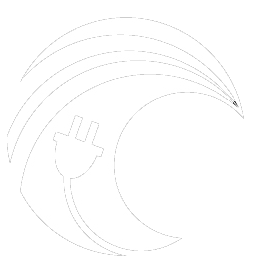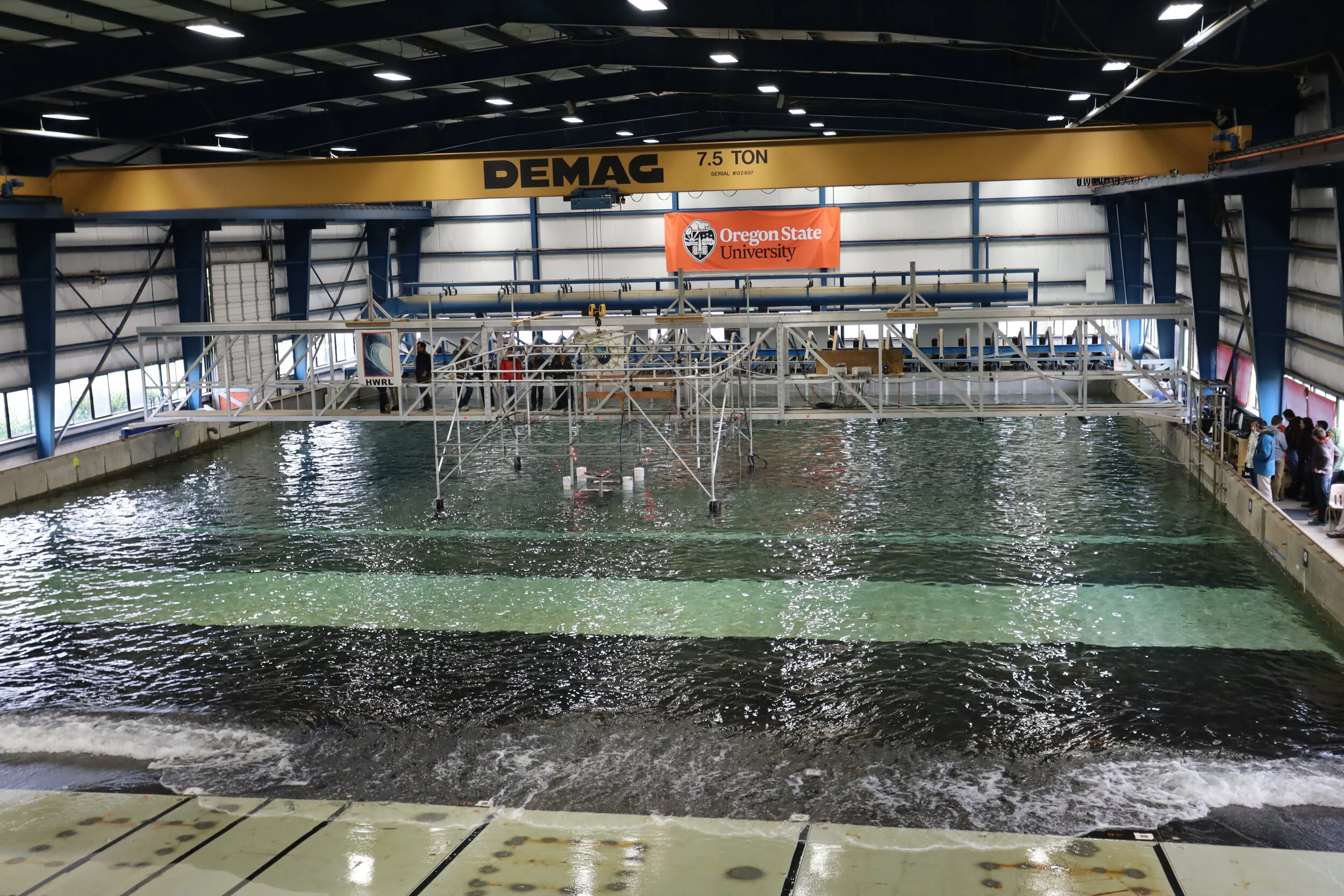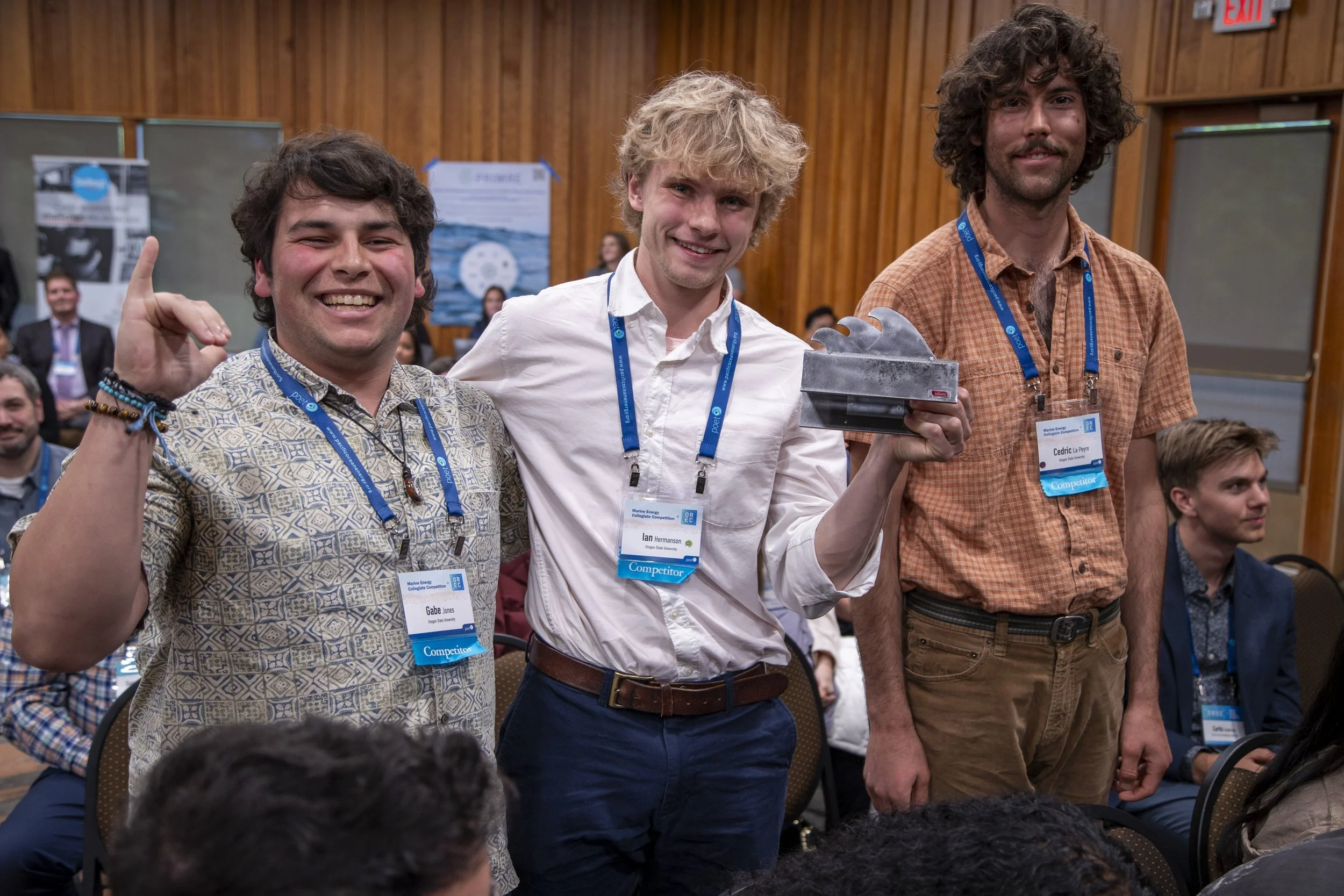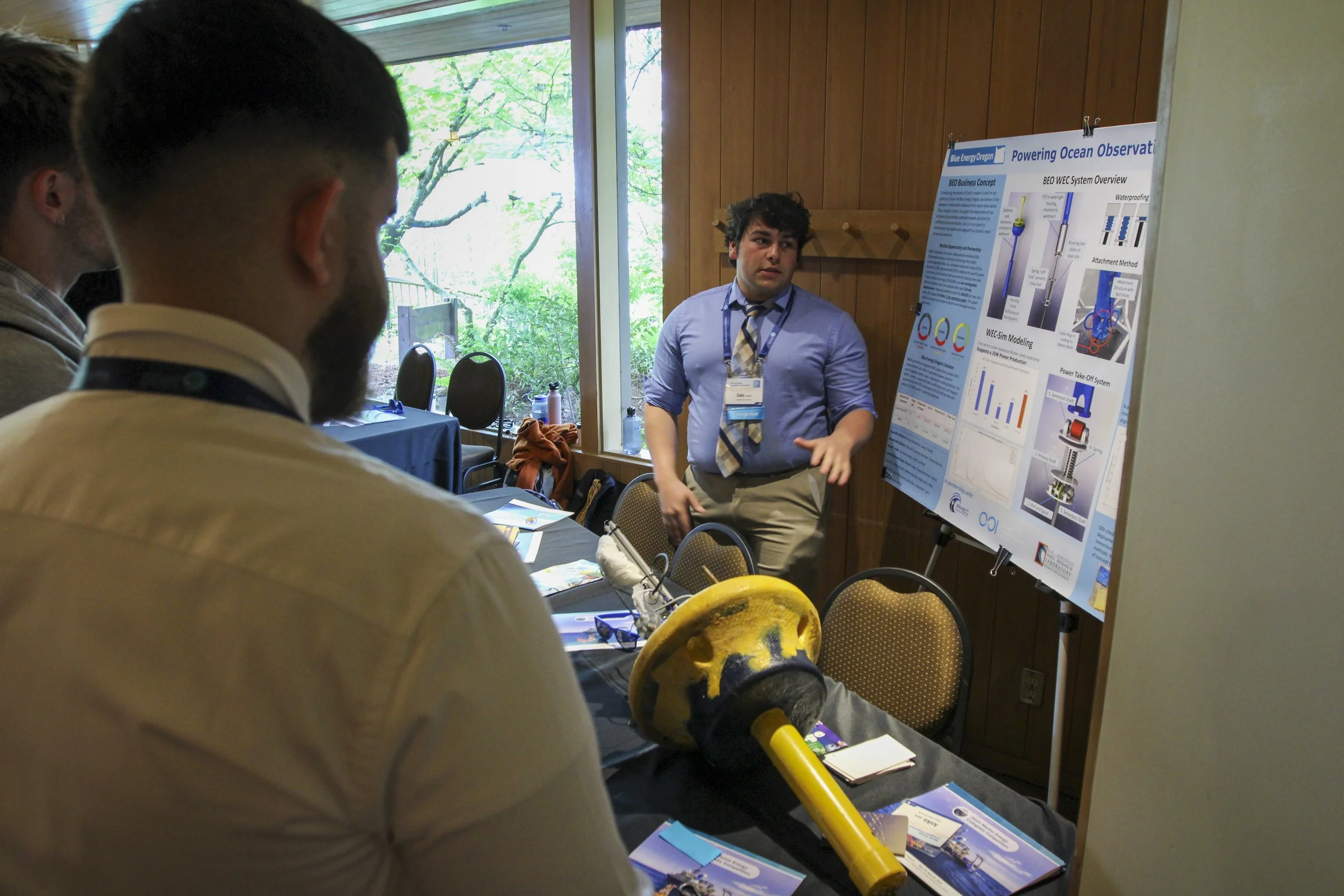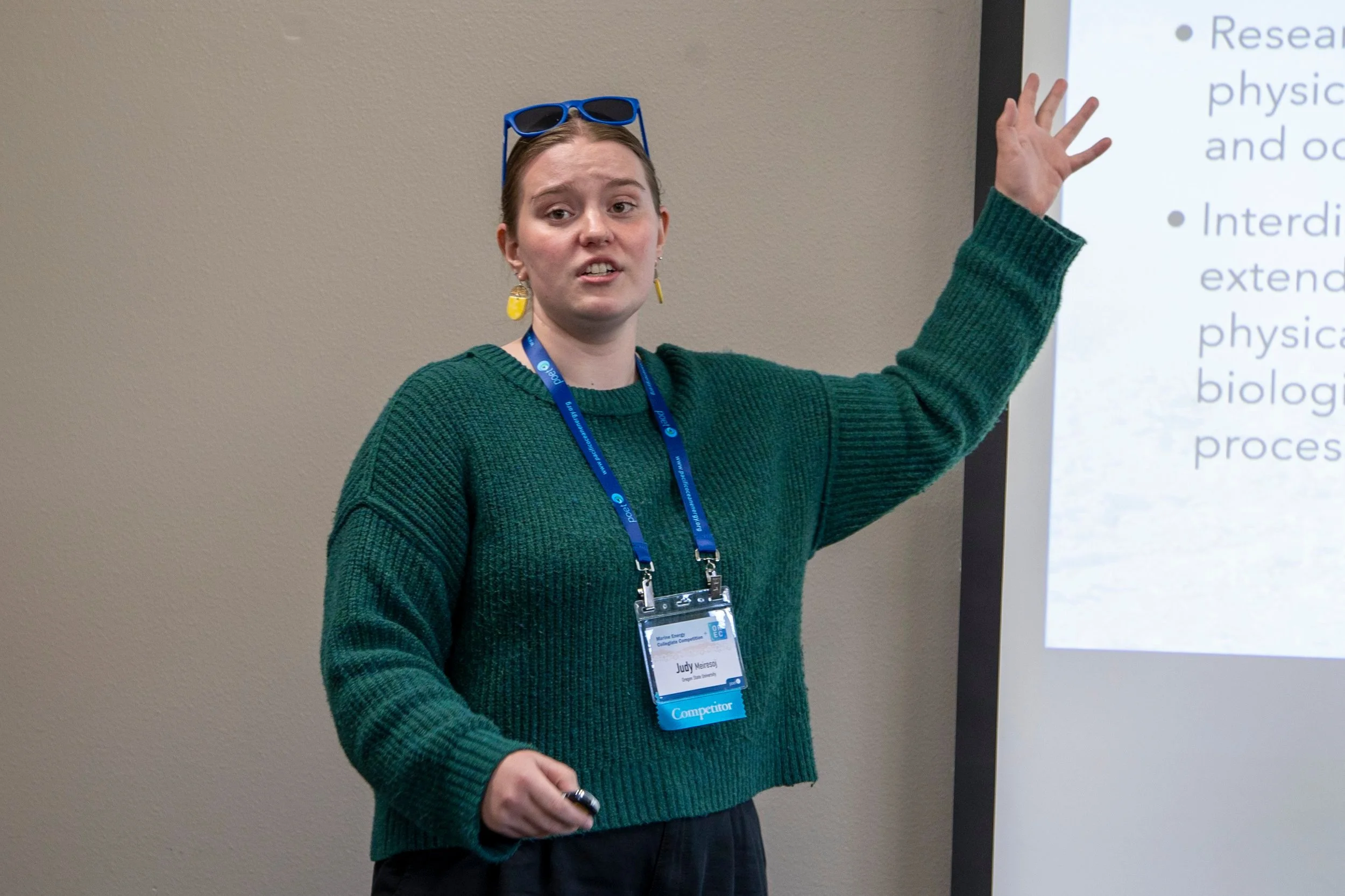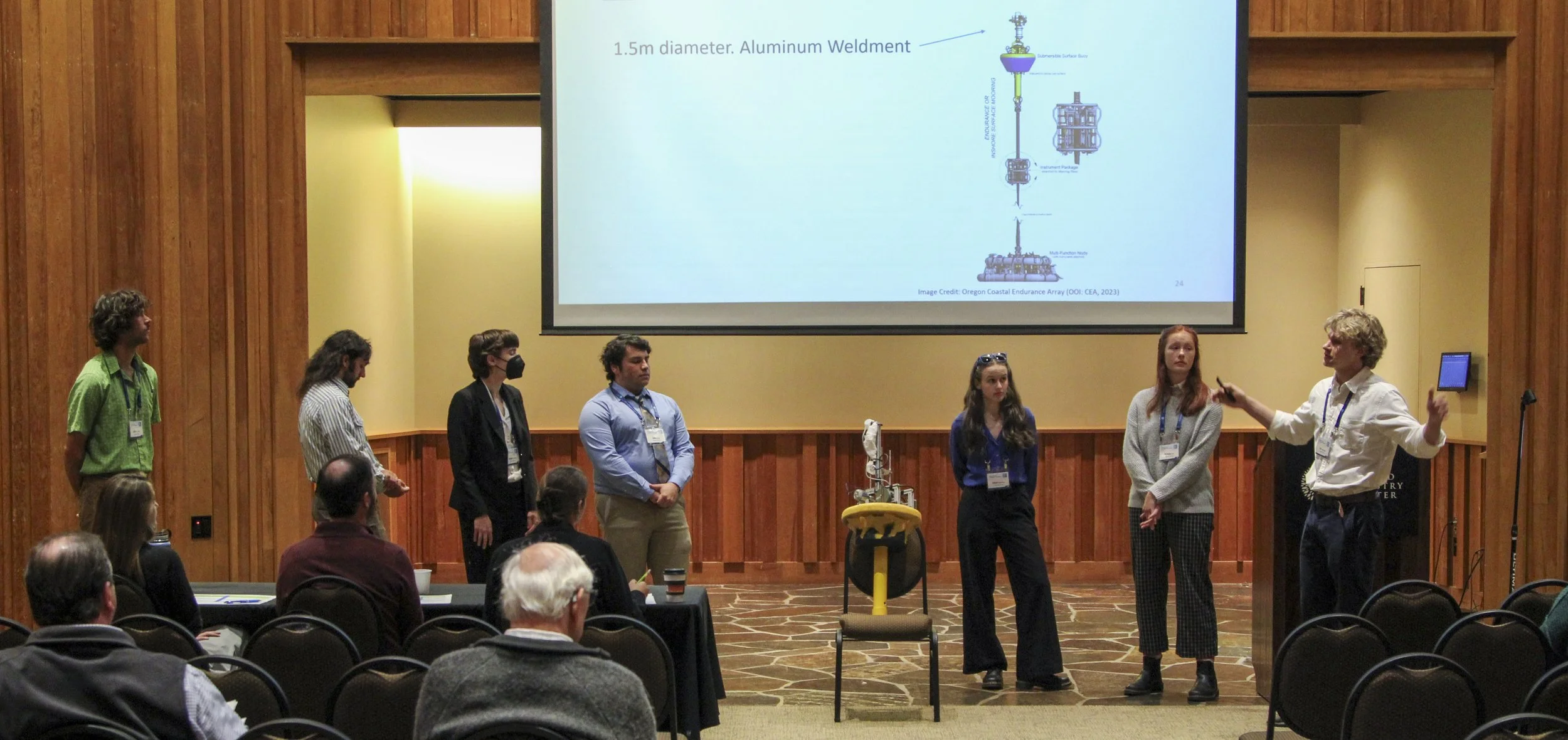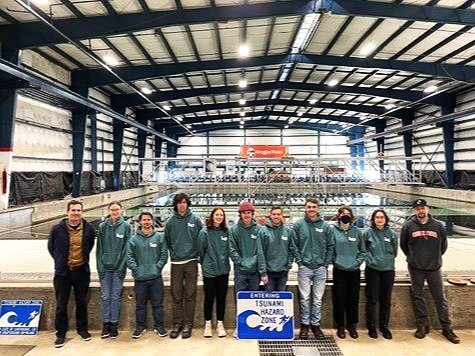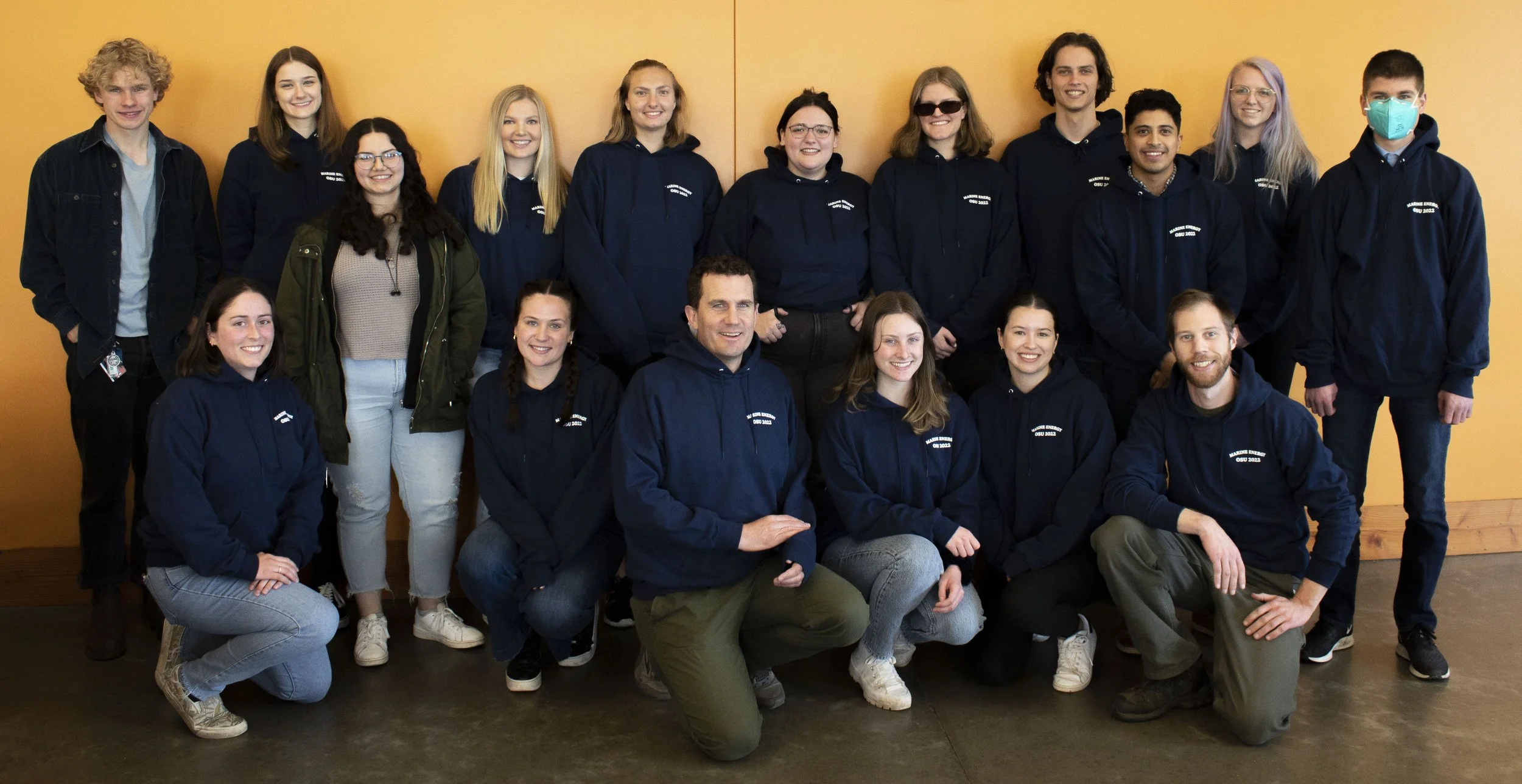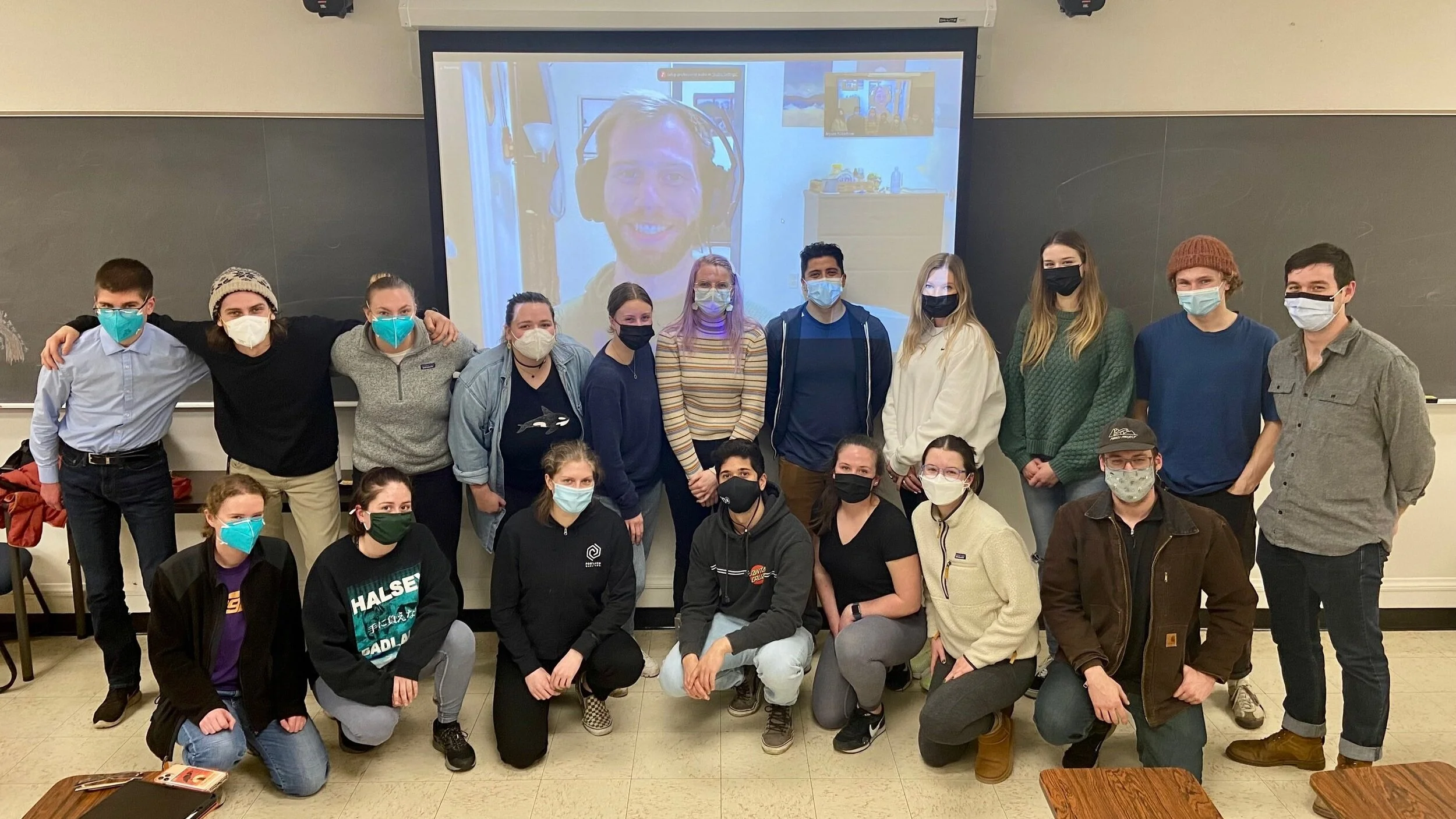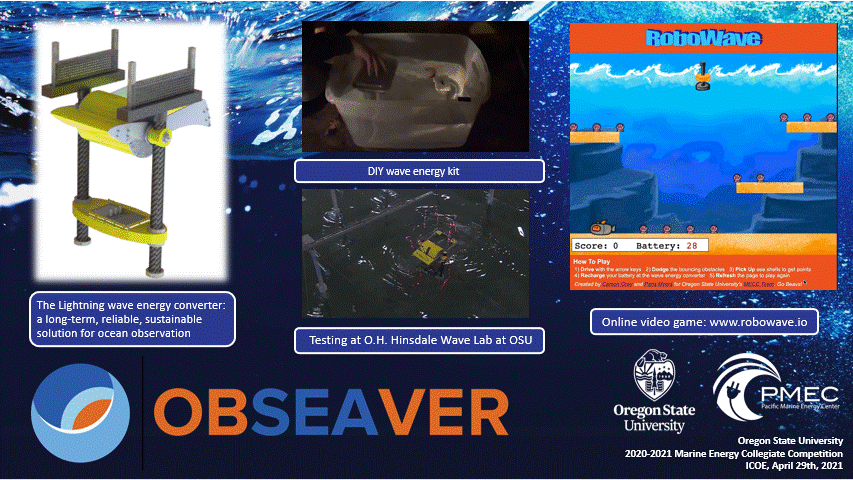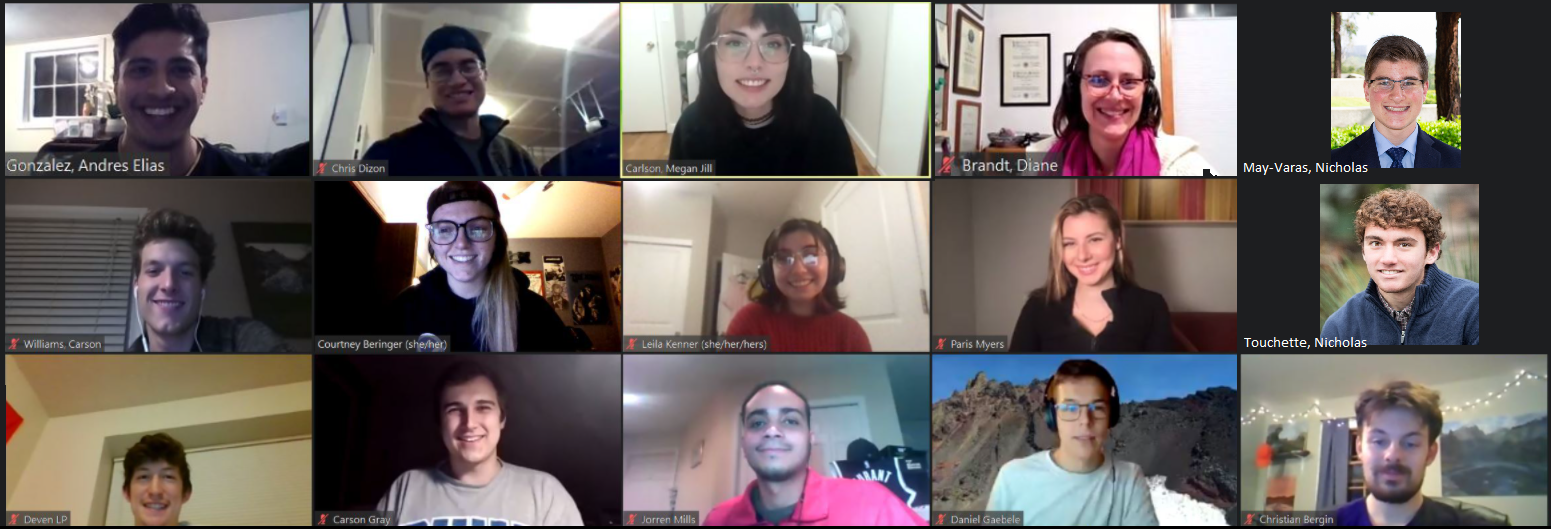Congratulations to the OSU MECC team (aptly named Beaver Blue Energy) who tied for third at the final MECC competition and won the “Best Build and Test award”!
The 2024 Marine Energy Collegiate Competition was held at the Ocean Renewable Energy Conference (OREC) in May. The teams were faced with four challenges, which focused on market analysis, technical design, prototype testing and community engagement. OSU partnered with the Corvallis Ocean Observatories Initiatives (OOI) staff, designing a wave power system for the OOI inshore buoys. The team divided and conquered, with senior engineering students taking on the technical design and prototype testing, while the rest of the team worked together on the market analysis and community engagement portions. Their goals were to produce a suitable final project,build a scale Wave Energy Converter (WEC), and successfully reapply to next year’s MECC.
In order to better understand what makes a marine energy project realistic, efficient and equitable, the team also interviewed several coastal oceanography scientists. They learned that research funding is the biggest hurdle, and the importance of community outreach before deploying devices so the locals have the chance to learn about what is happening and ask questions or voice concerns.
The 2023 MECC taught the team three important lessons that they were able to apply to this year’s competition:
1. It’s more effective to focus on the big picture
2. Start the final report early
3. Maintain consistent communication with the project sponsor to ensure all requirements are met
Read more about the 2024 OSU MECC team here: Beaver Blue Energy Click here to learn about the full 2024 MECC Results
OSU MECC 2022-2023 Update
MECC team testing at the O.H. Hinsdale Wave Research Laboratory at Oregon State University
During the 2022-23 competition cycle, the OSU MECC team partnered with the Ocean Observatories Initiative (OOI) Endurance Array. The OOI Endurance Array is an extensive network of moorings, gliders, and buoys that measure ocean properties off the coast of Washington and Oregon. After visiting OOI’s Corvallis office we learned that Endurance Array moorings suffer from severe power deficiency. Thus, OSU MECC formed “Valley Wave Energy”, a company developing a durable and efficient wave energy converter to supply supplemental power to OOI moorings. We worked closely with OOI technicians and scientists to design our product for real-world applications by addressing issues with biofilm and mooring. Our device generates power from bobbing floats mounted on a central axis. We can add more floats to scale our power output, allowing Valley Wave Energy to market to large and small future applications.
Our team constructed a model of our wave energy convertor and tested its efficiency and durability at the O.H. Hinsdale Wave Lab. The testing results were promising, and aligned well with preliminary tests done on WEC-Sim! We met with industry professionals and experts who provided a fantastic learning experience for team members. OSU MECC team members shared our excitement at an on-campus math conference and a clean-energy education webinar for high school and middle school teachers. We visited two schools and led students through an interactive “build your own wave energy convertor activity.” For the first time, a few team members flew to Washington DC where we presented at Water Power Week.
Our team’s biggest goal was to establish groundwork for success in the coming years. We are excited to announce that we have been accepted into the 2024 Marine Energy Collegiate Competition. Next year we will have the most returning team members OSU MECC has ever had! We will be continuing our partnership with OOI, and building on our work with clean energy education.
MECC team featured in Corvallis Advocate newspaper
Check out this article written about the OSU 2021-2022 team receiving second place in the competition: https://www.corvallisadvocate.com/2022/osu-takes-silver-in-marine-energy/
MECC 2021-2022 Results - 2nd Place!
The MECC OSU 2021-2022 team posing with team sweatshirts.
The Oregon State University MECC team took second place overall in the 2022 competition! The full results of the competition can be found on this DOE website. OSU had an outstanding virtual presentation, poster, and report which can be found here.
Here is a brief background on our team and market area:
Our company, Valley Wave Energy based out of Oregon State University is developing a wave energy converter that will generate power via an oscillating buoy, housing an internal PTO and generator. This power will be transferred to shore, where the system will desalinate ocean water using an off-the-shelf reverse osmosis system. Versatility and usability are at the core of our design.
The team sees multiple possible markets for wave-powered desalination. Seasonal workers, remote communities, and post-natural disasters are all viable options for our system.
Our team is composed of mostly engineering majors, ranging from civil, electrical, and mechanical engineers. We also have some key bioengineering and finance majors who help bring alternative perspectives to the business and technical requirements of the competition. We feel that our ocean-water desalination system will fill a market gap by providing a low-cost and reliable source of drinking water for those who need it most.
Meet the OSU MECC 2021-2022 Team!
MECC Team Photo
March 2022 - From left to right, here are the Oregon State University MECC team members!
Nicholas May-Varas: “I am a fourth-year Mechanical Engineering student with experience in developing numerical models to analyze ocean systems. I look forward to continuing to analyze ocean systems to help provide communities with sustainable solutions.”
Lisa Hildebrand: “I am a Master's student in Mechanical Engineering with a background in powertrain design and energy storage systems. I hope to help push the advancement of renewable energy technologies to combat climate change.”
Thomas Close: “I am an undergraduate Bioenegineering student, and Co-lead for the OSU MECC team. I am focused on bioninterfaces and cellular interactions, and I specialize in concept development and project implementation.”
Nina Hecht: “I am an undergraduate student majoring in Mechanical Engineering and minoring in Computer Science. I am passionate about finding renewable energy solutions to promote a greener future for our planet.”
Karly Vial: “I am a fourth year Civil Engineering student. I enjoy being a part of MECC and working with other engineering disciplines.”
Emma King: “I am an undergraduate student studying Mechanical Engineering with a minor in Sustainability. I really enjoy learning about mooring during this project because it is something I have never learned before. I am interested in wave energy because of the possibilities it has for energy production.”
Marina Keller: “I am a Mechanical Engineering undergraduate conducting research in the materials science laboratory. Undergraduate co-lead with a passion for renewable energy, and the future of alternative energy projects.”
Chantel Berger: “I am a senior in Mechanical and Manufacturing Engineering interested in a career in renewable energy. I joined MECC to challenge myself and learn more about marine energy.”
Aidan Kane: “I am an undergraduate Mechanical Engineering senior with an interest in electromechanical systems and how they integrate into renewable energies. I hope to apply novel mechanical solutions to advance the global transition to renewable energy.”
Courtney Beringer: “I am a graduate student in Coastal and Ocean Engineering with a background in Mechanical and Electrical Engineering. My passion is developing renewable energy to help combat the climate crisis and I am happy to be doing so in my studies and in MECC.”
Jonah Gadasi: “I am a Master's student in Coastal and Ocean Engineering program with an interest in floating body hydrodynamics and marine renewable energy. I would love to help propel marine renewable energy forward and bring it towards commercialization.
Andres Gonzalez: “I am Mechanical Engineering student with an interest in renewable energy solutions and energy conservation.”
Alexa Dietz: “As an undergraduate student in Bioengineering, I appreciate the interdisciplinary aspects of MECC that allow me to learn and apply new concepts for innovative marine energy solutions.”
Hailee Hayes: “I am a 4th year Civil Engineering student with an interest in hydrology. I joined MECC to challenge myself and make connections.”
Claire Johnston: “I am a senior undergraduate Civil Engineering student. I enjoy being a part of MECC because we come up with innovative renewable energy solutions.”
Alev Ersan: “I'm a fourth year Civil Engineering undergraduate student. I participate in MECC because I am passionate about using my education to create positive impacts.”
Jacob Triplett: “I am a Masters in Mechanical Engineering focusing on sustainable design and green energy. My goal is to design sustainable alternatives to current products for competitive prices so people have an honest ability to make changes to how they live, and have the ability to personally reduce pollution and affect climate change.”
Ian Hermanson: “I am a Sophomore in Mechanical Engineering with a minor in Studio Art. I am interested in applying interdisciplinary practices to sustainability questions.”
Nathan Algarra: “I am a graduate student in Mechanical Engineering focusing on renewable energy and design. My research interest is in functional design changes over time and their embodiment in wave energy converter technological progress.”
Oregon State University selected for MECC 2022!
“Wave Hello to the 2022 Marine Energy Collegiate Competition Teams”
September 2021
Oregon State University is among the 17 teams selected to participate in the 3rd Marine Energy Collegiate Competition. The team is looking to continue the success from last year, creating an even stronger business plan and continuing our educational outreach and engagement efforts. The team will be lead by Marina Keller and Thomas Close. This competition is highly interdisciplinary and we need students from engineering, business, marketing, environmental science, ocean related sciences, public policy, and art. Undergraduates and graduate students are both welcome to join the team! Check out our website to learn more about what we did last year!
The U.S. Department of Energy and the National Renewable Energy Laboratory announcement of MECC participants: https://www.nrel.gov/news/program/2021/wave-hello-to-the-2022-marine-energy-collegiate-competition-teams.html
Oregon State MECC Team Brings Home Two Awards
The MECC teams presented their public pitches to industry judges on April 26th and 27th, 2021. Business and technical reports along with a poster were also reviewed by the judges. The award ceremony took place at the 2021 International Conference on Ocean Energy, all in a virtual format.
Oregon State was awarded not one, but two awards! The outstanding work done by the team on the optional Build and Test section granted us the best Testing Award. The judges were extremely impressed by our educational outreach efforts which granted us the Community Outreach and Engagement Award.
The U.S. Department of Energy and the National Renewable Energy Laboratory announcement of winners: https://www.nrel.gov/news/program/2021/three-mecc-winners-2021.html
Image: OSU virtual public pitch, April 27th, 2021
2021 Project Summary
The Oregon State University team saw a great opportunity to power ocean observation needs with marine energy. We partnered with an industry expert, C-Power, to advance our engineering and business understanding of the current marine energy market. We established our company, Obseaver Marine Energy, which provides a robust, cost-effective, and sustainable solution to offshore ocean observation. Our device in called the Lightning Wave Energy Converter and is about 5m tall. The size is comparable to typical oceanographic buoys and is designed to replace buoys dependent on fossil fuels and intermittent sources like wind and solar. We adapted the Lightning from a C-Power design by designing sensor mounting plates and sizing the WEC for the power requirements of typical sensor packages.
We tested our device for performance and durability in the O.H. Hinsdale Wave Laboratory at Oregon State University. The results agreed well with our computational models in WEC-Sim and gave the team the great opportunity to get hands-on experience. Our team also did extensive work in educational and community engagement. We built model wave energy converter kits with Spanish-speaking families, presented at the Oregon State of the Coast conference, talked to high schoolers about college and marine energy, managed a website and Twitter, and made an online video game to play as a robot who needs power from a WEC! Play the game here: robowave.io.
Our Vision
We strive to prioritize engagement with communities and stakeholders, elevating the voices of the people who are most effected by marine energy devices. We believe this will set a new standard of community collaboration to other designers and developers in the marine energy industry.
Team Story
2.19.2021
Why participate in MECC?
The Marine Energy Collegiate Competition (MECC) provides students with the unique opportunity to develop innovative solutions related to marine energy. Having the opportunity to work in multidisciplinary teams provides everyone with the opportunity to learn about the many aspects of the marine energy industry. Our team is very interested in renewable energy and the MECC provides all students with the chance to directly apply their knowledge to a project. The MECC also has many elements incorporated into it, such as the business plan, the pitch, the build and test option, and the community outreach and educational activities. This comprehensive approach allows us to see all the factors involved in developing marine energy, get hands-on experience, and educate our community about the sector.
Project Description
Our Oregon State University MECC team is working with C-Power to develop a wave energy converter (WEC) that is integrated with oceanographic sensors and has the ability to provide power and a stable operating platform. This will be achieved by developing a “stabilization mode” that can adapt to the WEC’s local wave conditions meaning it will be able to operate in two modes. The first being to harness energy from the waves to charge a battery. The second being to actively control the WEC’s position such that movement of the entire system is minimized when sensors are collecting data, which will improve data collection accuracy.
Game Plan
We plan on simulating our WEC in WEC-Sim (Wave Energy Converter Simulator), which will provide us with insight into the dynamics and overall stability of the design. We also plan to develop a control system integrated into the motors of the WEC, which will be used for controlling the stability of the WEC. Furthermore, we plan on adding a sensor storage unit and battery storage. After the new features of the WEC have been implemented, we will test it at the O.H. Hinsdale Wave Research Laboratory. The tests will provide validation and information about how we can improve the design to meet our goals for the project.
Team Strengths
Our team is made up of a diverse group of individuals with many skillsets, which will improve the project through ensuring a comprehensive solution for communities utilizing the technology. We consist of a wide and diverse spectrum, including multiple gender and sexual identities, age and job experience, diverse cultures, as well as domestic, international, non-traditional, parent, and first-generation college students. Our team includes several disciplines and spans from second-year undergraduates to PhD students. These qualities have been and will continue to be an asset to our project and team collaboration.
Team Hurdles
One of the main technical hurdles that the team will overcome is developing a WEC with two operating modes: one for power production and one for system stabilization during data collection. The team will overcome this hurdle by researching various methods that could be implemented and deciding which provides optimal performance, while maintaining the survivability and effectiveness of the WEC. Due to COVID-19 restrictions in place at the lab, a limited number team members are able to work in the space at a time, creating difficulties for design and testing. The wave basin is a shared, university facility that accommodates other researchers and students, creating limited openings for MECC work.
Competition Objectives
The MECC offers our team members a chance to work on a “real world” issue and emerging technology – a valuable opportunity for us all. Two specific team objectives are to develop a WEC that provides power to oceanographic sensors and to create a comprehensive market plan that incorporates industry needs and addresses community concerns. We hope to achieve these competition objectives through utilizing our resources in PMEC, our continued team collaboration, and our ongoing communication with stakeholders.
Social Media Accounts
https://www.pmec.us/mecc-2021-osu
Twitter: @OSUMECC
State of the coast 2020
November 2020
The State of the Coast Conference (SotC) is Oregon’s Conference for everyone invested in the Oregon coast through their work, hobbies, or simply their love of the marine environment. SotC brings together researchers, industry, and community leaders to engage on current marine science and policy issues. More information can be found at: https://seagrant.oregonstate.edu/state-coast. The OSU MECC team was grateful for the opportunity to participate in the virtual student poster session at SotC in November 2020. We used the chance to introduce our team, the project and competition, and our vision of developing a WEC in a holistic manner to be mindful of those interacting with it in the shared space of the marine environment. We gained invaluable, diverse connections and feedback regarding Oregon’s coast and the coastal population’s need for clean methods of energy production which also respect the environment and prioritize cultural preservation. Our interest was piqued by presentations addressing Ocean Observation applications such as a talk about the Newport Hydrographic Line (https://terra.oregonstate.edu/2018/02/towing-the-line/). This inspired us to continue forging the path for the following months of outreach and narrow down a direction for the competition.
Meet the OSU MECC 2021 Team!
ABOUT THE TEAM MEMBERS
Christian Bergin - I am a fourth year undergraduate student studying marketing. I am excited to expand my knowledge of the blue economy and work with with STEM students to develop renewable technologies.
Courtney Beringer - I am a graduate student in Coastal and Ocean Engineering with a background in Mechanical and Electrical Engineering. Developing renewable energy to help combat the climate crisis is my passion and I am so happy to be doing so in my studies and in MECC.
Diane Brandt - I am in my second year of the Master's in Public Policy program, focusing on environment and energy. My research is on the current status of marine renewable energy in Oregon.
Megan Carlson-Funk - I am in my final year of my Bachelors in Environmental Science. I have a special interest in marine resources and alternative energy, so I am thrilled to work on this project!
Chris Dizon - OSU PhD graduate student in Electrical Engineering.
Daniel Gaebele - OSU PhD graduate student in Electrical Engineering with a minor in Civil Engineering, focus on ocean and coastal engineering. I am passionate on using my engineering skills for working towards a greener economy or assisting in times of crisis such as in my PhD project in developing a small wave energy converter to help monitor harmful algae blooms or in the MECC challenge. I am currently working on decentralized control of WEC arrays for my Ph.D., following my graduate degree in Engineering Cybernetics. I hope to be working on clean MRE not motivated by capitalism and I am grateful that the MECC offers those opportunities.
Andres Gonzalez - I am a fifth-year undergrad student at OSU studying mechanical engineering with a focus in renewable energy. I'm excited to be a part of the OSU MECC team because I am passionate about sustainability and learning.
Carson Gray - I am a masters student in Robotics, focused on computer vision applications in human robot interaction. In this challenge, I hope to gain more experience working at the intersection of business and engineering.
Leila Kenner - I am an undergraduate student majoring in Environmental Engineering with an interest in renewable energy. I am excited to be a part of this multi-disciplinary team and to explore the blue economy and community outreach.
Deven Leon-Patino - I am an second year student in Environmental Engineering interested in all things water. What I found interesting about the MECC is that interest in "the blue economy" is fairly new given that the potential within the field is vast and I would like to learn more about it.
Nicholas May-Varas - I am an undergraduate student majoring in Mechanical Engineering and an undergraduate research assistant with the Pacific Marine Energy Center. I am very interested in the development and integration of renewable energy technologies on a global scale and am grateful to have the opportunity to be a part of the MECC.
Jorren Mills - I am a second year graduate student studying sports business leadership at Seattle University. I hope to gain a greater understanding of the blue economy and what I can do to impact climate change by being apart of OSU's MECC team.
Paris Myers - I am a fourth year undergrad, double majoring in bioengineering and fine art at OSU's Honors College. My passion for interdisciplinary collaborations and innovative, global solutions inspired me to join OSU'S MECC team. Outside of school, I am an undergrad researcher in the SHARE robotics lab with Dr. Naomi Fitter, and am working on my honors thesis with OSU's Dr. Solomon Yim.
Nicholas Touchette - I am in my fourth year of undergraduate study in Mechanical Engineering. My ultimate goal is to work with water whether it be with wave energy converters or watercraft.
Carson Williams - I'm in my fourth year of undergrad studying Climate Science and Oceanography in hopes of changing the path we've set for ourselves.
Marine energy collegiate competition
October 2020
This year the U.S. Department of Energy is hosting the second Marine Energy Collegiate Competition (MECC) to advance marine renewable energy. The MECC challenges students to gather a diverse team with the goal of providing a real-world experience through developing a functioning prototype to power the blue economy and preserve the marine environment.
We are happy to announce that the team based on Oregon State Universities students got accepted to the 2021 MECC among 17 “top-notch” student teams.
banner photo provided by Bret Bosma
